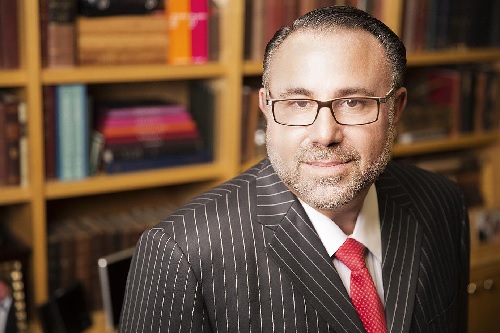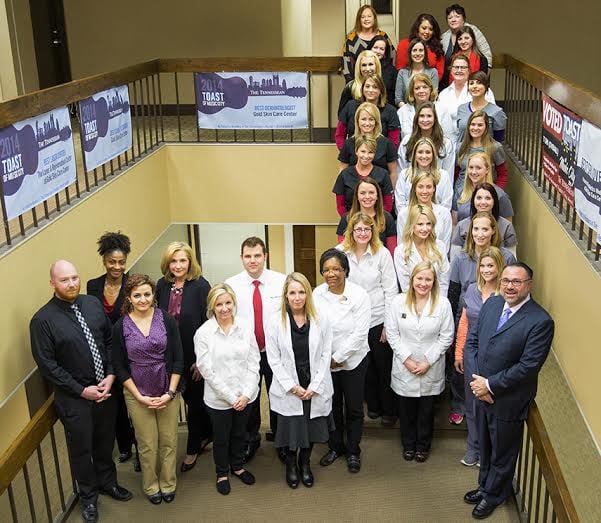Dr. Michael Gold - Gold Skin Care Center, Nashville
With 30 years of cosmetic dermatology experience Dr. Gold shows no signs of slowing down as he continues to grow his Nashville practice.
Dr. Michael Gold is a cosmetic dermatologist in Nashville Tennessee who was kind enough to sit down for an interview and give us his insights into how he runs his clinics, what technologies he uses, and what he's learned.

Name: Michael H. Gold, MD
Clinic: Gold Skin Care Center
Location: Nashville, Tennessee
Website: www.goldskincare.com
You've been working in this area for quite a while. What made you pursue cosmetic dermatology and aesthetic medicine?
I actually got started thinking about dermatology and aesthetics when I was 16 years old due to a bad case of acne, that I had when I was a young man. My dermatologist was Dr. Albert Kligman who invented Retin A and I was one of his first patients he placed on this medication. It was a strong formulation and within a week I had peeled the equivalent of today’s medium depth chemical peels. My skin was really smooth after that, and I thought - derm is the route I want to pursue in medicine. In my residency - actually my first day, I did a hair transplant with Dr. JB Pinski and the second day I did a liposuction procedure with my chairman Dr. Henry Roenigk. Dr. Roenigk was keen on cosmetic dermatology and instilled this love for aesthetics and surgery into me. I learned much from him and my other professors at Northwestern during my time there - especially from Drs. Jerry Garden, Ruth Frankel, and June Robinson. When I finished my residency I moved to Nashville, TN where I began seeing lots of patients interested in cosmetic concerns. This, along with my love of dermatology in general, helped propel my career in this field.
I was very fortunate to have played a role in the use of topical silicone gel sheets for hypertrophic scars and keloids and was part of the team that helped bring topical ALA into the US for not only AK use but for rejuvenation of the skin as well. I have been involved in lasers and light sources for years and had the first dedicated IPL for hair removal, which became a popular method around the world for hair removal. And I have played a role in absorbable suture technology for skin lifting.
Cosmetic dermatology has been very good to me - and with hard work and determination it can be for anyone who so desires.
You must have learned a little something about what you want as a work-life balance overseeing what is really quite a large clinic. What can you tell us about how you run your clinic and how it's organized?
Our clinic is very efficient - at least we like to think so. We have about 25,000 square feet of space all under one roof. We have many facets of our business and we have proven leaders who help oversee the various parts of our puzzle. We have a general dermatology area with 22 exam rooms that is staffed with 3 mid-level providers and myself. We have a medical spa with a dedicated aesthetician staff who perform services and sell skin products - which number about 500. We have a dedicated laser and rejuvenation center with their own dedicated staff where cutting edge treatments occur with either energy based devices (n=43) or with one of the injectable products we use. And we have a separate, dedicated research center, staffed with trained and outstanding nurses - all certified research professionals under my guidance. We have recently just added one of the most respected plastic surgeons in the US, he is now focusing his attention on hair transplants.
We have a staff of almost 50 employees and they are coordinated by our COO and CFO, Ms. Amy Anderson and for the research department we have Ms. Julie Biron. Amy uses department managers to assist her in the daily operations of the practice, which has been estimated by some to be one of the busiest practices anywhere in the nation. Our patient population varies from day to day but on average between 200 and 250 people pass through our doors daily. Patients come to us from all over the region and from most states in the US as well. Because of my international travel, we have visitors train with us on a regular basis and teaching these young and eager students has been some of the most rewarding work we have done.
A clinic that large, with that number of patients every day, is some serious work... It had to take some time to build out. How do you manage your team?
At the beginning it was easy - find the best of the best and pay them more than anyone else. But most importantly, treat them with respect and allow them to do the work that you hired them to do. Do not micromanage your senior staff - trust them to have your best interests at heart, and have the proper checks and balances in place to make sure that things run smoothly and efficiently.
We do use commission for our spa staff - shared amongst them so not to have a competition for each and every patient who comes to our spa. This has worked for me and therefore we have used this plan the longest.
Which technologies - IPL, lasers - are you using in your practice and how do you decide what to buy?
I may be a little different when it comes to IPLs and how we use them and how we decide to get them into the clinic. I had the second dedicated IPL for vascular lesions way back when and had the first dedicated IPL for hair removal after that. Which means that we have been working with IPLs for over 23 years now. Our clinic, along with a few others, studied and worked through the parameters to make what we now have - safe and effective and reproducible IPLs. When you decide to purchase an IPL make sure that it has a squared pulse, contact cooling, and sophisticated software parameters. The major device companies all have great IPLs - we usually stick with Lumenis, Syneron, Alma, Venus, and Sciton - where we have devices from. These are well made, well studied IPLs that one can surely trust.
Technology purchases are run through the committee in my office - I want everything so we have my office COO and CFO who must sign off on anything I want, which means we only get what we need. You don’t need devices sitting around and collecting dust - you need them to be productive and used on a regular basis. If we buy a new device today, we try to set a time line as to when that device needs to be paid off for us to be successful. It works most every time, and makes us concentrate on the task at hand.
What can you tell us about your marketing strategies?
Marketing has changed over time and I do things a lot different than I did when I first started in practice 30 years ago. Now things like social media are key to getting the message out there and we do use social media to spread the word and advertise what we are doing in our clinic. I think intrinsic advertising - using your own data base for advertising is the way to go today and having means of getting referrals from patients and colleagues as well. This is where we are today, plus newsletters and e-mail blasts and signs in the office.
In the past we used a lot of print advertising which at the time made sense - it really does not any more.
The other thing that we did 30 years ago was to be very involved in the community and we attended almost every charity event in town which was a great way to meet people and to determine which charities and causes would shape our giving’s over time. We still participate as often as we can and our community has been incredible kind to us over these 30 years.
Where do you see the aesthetic market going? Which treatments are the most popular?
Everything we do hopefully is profitable. As I said, we value our purchases and try to have them paid off in a specific period of time to make sure that profit starts at an appropriate time. If you buy a 100K machine and use it once a year, it is not going to be profitable. If you use that same device 5 times a day, then it is a different story.
My most profitable device at this time is the Aerolase Neo - I have a large acne population - as you can tell from question one - and we use the Neo to treat acne painlessly and successfully. It can be used for many indications but for us acne is number one.
But every procedure needs to be profitable and I am happy to say that almost everyone is in our clinic.
You've undoubtedly seen a lot running a large clinic with thousands of patients. What have you learned, and what advice would you give to other physicians?
I have learned much over these past 30 years. I have learned that my best friends do the same things that I do - David Goldberg, Mark Nestor, and Mitch Goldman. All of my mentors and friends taught me to be ethical and honest, to work harder than anyone else, and to give back to my specialty whenever I could. And hopefully the examples I have set for some of my mentees over the year have shown that drive, determination, compassion, and skill make for the best cosmetic practitioner and dermatologist.
My advice to others is real simple - learn your craft well, treat it with respect, and always put the interests of your patients above your interests.
We are blessed in what we do and we need to remember this each and every day.

About Dr. Gold
Dr. Michael H. Gold is the founder of Gold Skin Care Center, Advanced Aesthetics Medical Spa, The Laser & Rejuvenation Center, and Tennessee Clinical Research Center located in Nashville, Tennessee. Dr. Gold is also a Clinical Assistant Professor at Vanderbilt University School of Nursing and an Adjunct Assistant Professor at Meharry Medical College, School of Medicine, which is also in Nashville. He is a Visiting Professor of Dermatology for Huashan Hospital, Fudan University in Shanghai, China (11/2006), Guangdong Provincial People’s Hospital, Guangzhou, China, as well as a Visiting Professor of Dermatology at Number One Hospital of China Medical University (11/2008) in Shenyang, China.
Dr. Gold is a board-certified dermatologist and cosmetic surgeon who oversees the various facets of the Center’s operations: a combination of medical and surgical dermatology, cosmetic dermatology, aesthetic services, and research endeavors. Dr. Gold has earned a national and international reputation for providing patients with leading-edge technological advances and has expertise in all facets of dermatology and aesthetic care. The Tennessee Clinical Research Center is now one of the leading dermatologic research institutions in the U.S.
Dr. Gold speaks on national and international fronts, focusing on dermatology issues related to the use of lasers and energy-based devices, as well as the use of fillers and toxins in aesthetic and cosmetic dermatology. He lectures in venues around the world and is a sought-after contributor to educational meetings globally.